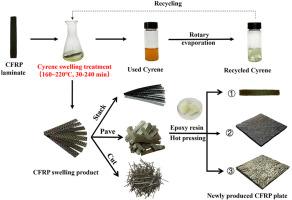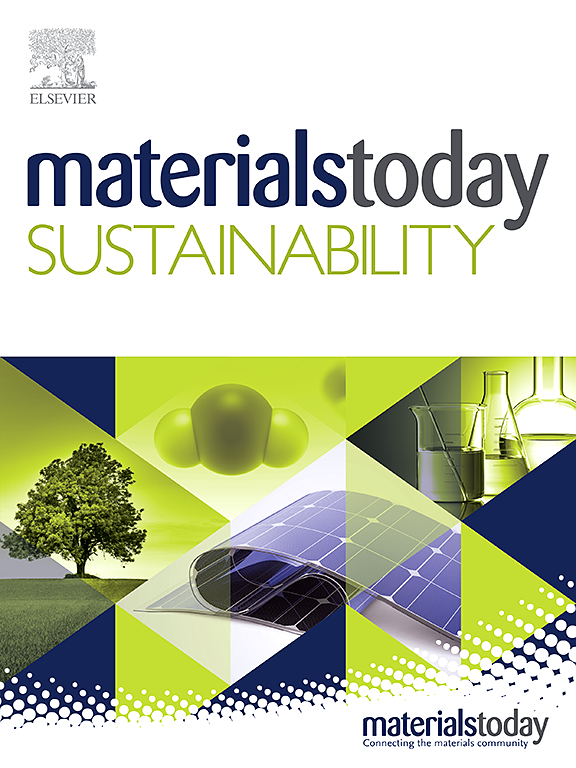昔兰尼作为生物基溶剂用于碳纤维增强聚合物层压板的绿色分层回收
IF 7.9
3区 材料科学
Q1 GREEN & SUSTAINABLE SCIENCE & TECHNOLOGY
引用次数: 0
摘要
树脂基体的脆性和刚性使得将碳纤维增强聚合物(CFRP)层压板切割成薄片并将其重新加工成强定向刨花板变得困难。为了解决这一限制,昔兰尼是一种可生物降解的、无毒的生物基溶剂,通过诱导树脂膨胀来回收CFRP层压板。在160-220℃大气压下,Cyrene在30-240 min内充分膨胀软化环氧基体。树脂溶胀率为53.40% ~ 303.39%,相应的质量损失率为0 ~ 12.59%。由此产生的体积膨胀导致层压板分层成柔韧的单层碳纤维(CF)片。这些薄片随后被切割、干燥、交叉堆叠,并热压成新的CFRP板。重新制备的层压板的弯曲、拉伸和层间剪切强度分别为原CFRP层压板的72.3% ~ 77.5%、74.6% ~ 87.0%和84.6% ~ 88.3%。这种温和的工艺保留了CF长度和机械性能,同时将废树脂转化为新产品。用减压蒸馏法回收热稳定的昔兰尼。本研究提出了一种绿色、全组分的碳纤维增强塑料废弃物回收策略,通过资源节约和再利用支持可持续发展。本文章由计算机程序翻译,如有差异,请以英文原文为准。

Cyrene as a biobased solvent for the green delamination recycling of carbon fiber-reinforced polymer laminates
The brittle and rigid nature of the resin matrix makes it difficult to cut carbon fiber-reinforced polymer (CFRP) laminates into thin slices and reprocess them into strongly oriented strand boards. To address this limitation, Cyrene, which is a biodegradable, non-toxicity biobased solvent, was employed to recycle CFRP laminates by inducing resin swelling. At 160–220 °C under atmospheric pressure, Cyrene fully swelled and softened the epoxy matrix within 30–240 min. The resin swelling rate ranged from 53.40 % to 303.39 %, with corresponding mass loss rates of 0–12.59 %. The resulting volume expansion led to delamination of the laminate into pliable monolayer carbon fiber (CF) sheets. These sheets were subsequently cut, dried, cross-stacked, and hot-pressed into new CFRP plates. The re-prepared laminates exhibited flexural, tensile, and interlaminar shear strengths ranging from 72.3 % to 77.5 %, 74.6 %–87.0 %, and 84.6 %–88.3 % of the original CFRP laminates. This mild process retained the CF length and mechanical performance while transferring waste resin into the new product. Cyrene, being thermally stable, was recovered by decompression distillation. This study offers a green and full-component recycling strategy for CFRP waste, supporting sustainable development through resource conservation and reuse.
求助全文
通过发布文献求助,成功后即可免费获取论文全文。
去求助
来源期刊

Materials Today Sustainability
Multiple-
CiteScore
5.80
自引率
6.40%
发文量
174
审稿时长
32 days
期刊介绍:
Materials Today Sustainability is a multi-disciplinary journal covering all aspects of sustainability through materials science.
With a rapidly increasing population with growing demands, materials science has emerged as a critical discipline toward protecting of the environment and ensuring the long term survival of future generations.
 求助内容:
求助内容: 应助结果提醒方式:
应助结果提醒方式:


